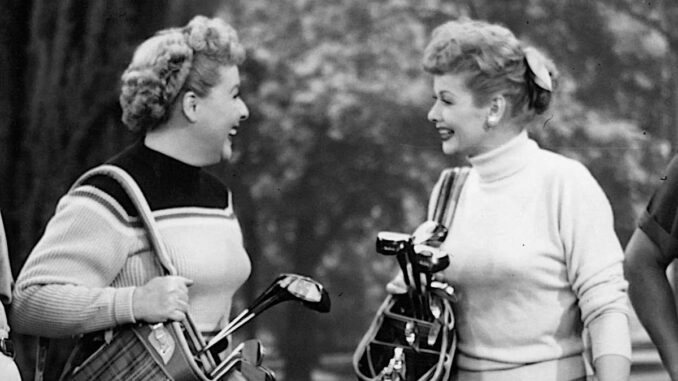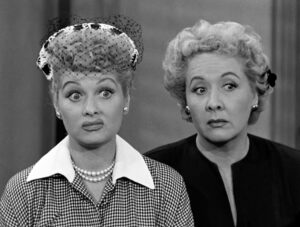
Vivian Vance’s Contract Clause: A Hollywood Story Worth Telling
Behind every classic TV show lies a world of untold secrets, and I Love Lucy is no exception. While most fans remember the hilarious antics of Lucy and Ethel, few know about the unique—and somewhat shocking—contractual demands placed on Vivian Vance, who played Ethel Mertz.
Why Vivian Vance Had to Weigh More Than Lucille Ball
The dynamic between Lucy and Ethel was iconic, but it wasn’t just their on-screen chemistry that made them unforgettable. According to Hollywood lore, Vivian Vance’s contract stipulated she had to weigh at least 10 pounds more than Lucille Ball. Why? It was all about maintaining the visual dynamic that kept audiences laughing.

The Pressure of Physical Appearance in 1950s Hollywood
The 1950s were a different time, especially when it came to how women were portrayed on television. The entertainment industry often valued women not just for their talent but for how they looked next to their co-stars. This clause ensured that Ethel would appear as the frumpier, less glamorous sidekick to Lucy’s vivacious and mischievous character.
Who Was Behind This Controversial Clause?
It’s believed that the decision came from Desilu Productions, the company founded by Lucille Ball and Desi Arnaz. Maintaining the contrast between Lucy and Ethel was seen as essential to the show’s comedic balance. But how did Vance feel about this stipulation?
Vivian Vance’s Reaction: A Mix of Humor and Frustration
Vance reportedly had mixed feelings about the clause. On one hand, she was grateful for the role that catapulted her to fame. On the other, being contractually obligated to maintain a specific weight—especially one heavier than her co-star—was a constant reminder of the industry’s harsh beauty standards.
A Partnership Rooted in Comedy, Not Competition
Despite the unusual contract terms, Vance and Ball developed a close friendship. Their off-screen bond translated into comedic gold on screen. However, this friendship didn’t completely shield Vance from the pressures of Hollywood’s obsession with image.
The Role of Desi Arnaz in Shaping the Duo’s Dynamic
Desi Arnaz, as both Ball’s husband and the show’s producer, played a pivotal role in crafting the dynamic between Lucy and Ethel. He understood that comedy thrives on contrasts, and the weight clause was just one way to visually emphasize their differences.

Hollywood’s History of Controlling Women’s Bodies
This wasn’t the first—or last—time that an actress’s physical appearance became a contractual obligation. From Marilyn Monroe to Judy Garland, Hollywood has a long history of dictating how women should look, often at the expense of their health and well-being.
How Did Fans Perceive Ethel Mertz?
To audiences, Ethel was a relatable, down-to-earth character who balanced Lucy’s wild schemes. Little did they know, this perception was carefully curated through contractual stipulations and wardrobe choices.
The Legacy of Vivian Vance and Lucille Ball’s Partnership
Decades later, the partnership between Vance and Ball remains a benchmark for female-led comedy. Their ability to play off each other’s strengths—and differences—created timeless humor that still resonates today.
Breaking the Mold: Vivian Vance’s Impact on Television
Vance didn’t just play a sidekick; she helped redefine what it meant to be a woman on television. She brought depth and humor to a role that could have easily been one-dimensional, proving that comedic talent isn’t tied to appearance.
What Can We Learn From This Today?
The story of Vivian Vance’s weight clause serves as a reminder of the progress we’ve made—and the challenges that still exist—in the entertainment industry. It’s a testament to the resilience of women like Vance, who navigated these pressures with grace and humor.
Modern-Day Relevance: How Far Have We Come?
Today, there’s a growing movement toward body positivity and inclusivity in media. However, the journey is far from over. Reflecting on stories like Vance’s helps highlight the importance of continuing to challenge outdated norms.
Conclusion: A Tale of Talent and Tenacity
Vivian Vance’s experience on I Love Lucy is more than just an interesting footnote in television history. It’s a story of talent, resilience, and the complex dynamics of Hollywood’s golden age. Despite the challenges, Vance’s legacy as Ethel Mertz remains a shining example of comedic brilliance.
FAQs
1. Why did Vivian Vance have to weigh more than Lucille Ball?
Vivian Vance’s contract stipulated she weigh 10 pounds more than Lucille Ball to maintain a visual contrast between their characters, enhancing the show’s comedic dynamic.
2. Did this weight clause affect Vivian Vance’s performance?
No, Vance’s comedic talent shone through regardless of the clause. However, it did highlight the era’s strict beauty standards.
3. How did Lucille Ball feel about this clause?
Lucille Ball and Vivian Vance shared a strong friendship, and Ball reportedly admired Vance’s professionalism, though the clause was a production decision.
4. Was this type of contract clause common in Hollywood?
Yes, similar clauses were used in Hollywood to control actors’ appearances, reflecting the industry’s emphasis on visual dynamics.
5. What is Vivian Vance’s legacy today?
Vance is remembered as a trailblazing comedic actress whose role as Ethel Mertz set a high standard for female sidekicks in television comedy.